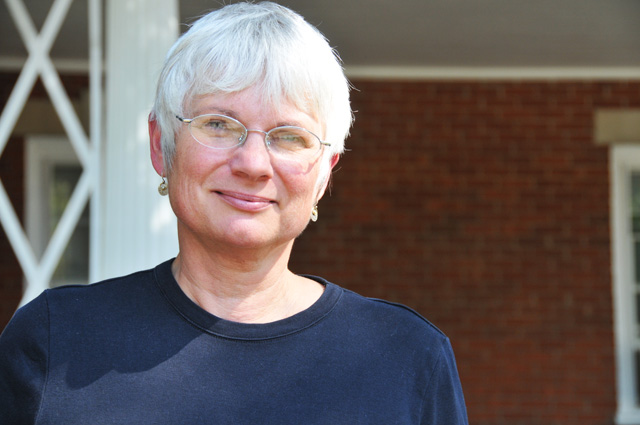Schiavi Supports Romance Language Department

Q: Kristine, when did you come to Wesleyan?
A: I started working at Wesleyan in January of 2006, originally as an AA in University Relations.
Q: What are your main job responsibilities?
A: My job responsibilities are wide and varied. My job is to provide support to the Romance Language Department, including 23 faculty members and five foreign teaching assistants. Specifically, that can mean anything from supervising student workers and organizing information to planning events and travel, as well as accounting for more than 50 accounts, and troubleshooting any manner of old building problems: stuck windows to leaky plumbing to any matter of the things in between. Every day brings shifting priorities and a new set of problems and time constraints. What I like very much about this job is there is always variety and challenges.
Q: Do you have any interest in romance languages yourself?
A: Although I wish I could speak another language, I don’t actually want to practice and learn. That goes for playing the violin too! I am, however, very interested in people and places. I enjoy tremendously interacting with the countries and cultures represented in the department and making our visitors feel at home. I also have attended a few of the events we have hosted.
Q: What do you like best about working in the department?
A: I like working here very much because I feel that I make valuable contributions to the department, my work is respected and I have a great sense of autonomy here. I feel fortunate that I’m doing a job I like in such a beautiful place filled with so many smart, engaging people. Most of my work is computer-driven; generally I am supporting staff via e-mail communication, and performing various tasks online. I have face-to-face time with most faculty on their teaching days, whether it is a request of support, or a chat about what’s happening on campus or in the world.
Q: What attracted you to Wesleyan?
A: The tenure of its employees; there had to be something about a place that has so little turn over. In the 70s, Wesleyan was filled with radical types, and it always held a fascination for me. I grew up locally, and to high-schoolers attending the old, old Middletown High, of course Wesleyan was on the cutting edge. We were often here masquerading as college students and sharing burgers at the grill in Downey House.
Q: What is your interest in the campus?
A: I love the campus and the buildings and the history of the place. I’m here early in the morning twice a week walking the campus. Every time, I do I notice more of the architecture, the lovely framed views and the gracious old homes.
Q: What were you doing before coming to Wesleyan?
A: Before coming to Wesleyan, I was a subsidiary rights manager for a literary agency. I sold audio, film and foreign translation rights for nonfiction books. I met with people from all over the world and got to read a lot of great books! I miss the free books!
Q: According to Professor Emerita Joyce Lowrie, your “photography is simply splendid.” What is your interest in photography and what is your favorite subject matter?
A: I’ve always loved art, but have no talent for drawing or painting. I became interested in photography because I wanted to capture images. Time is such a liquid thing, I felt I had to be able to stop moments and revisit them. My favorite subjects are flowers and architecture. I like to do flower portraits, catching the light, shading and softness of the petals. I like buildings, especially old buildings, but since starting to take pictures, I’ve grown very fond of the Center for the Arts buildings. There is an interesting juxtaposition of simplicity and complexity that keeps drawing me back.
Q: What are your other hobbies and interests?
A: Besides photography, I enjoy gardening and reading English mysteries. I can be a two- or three-book a week person on vacation. Also, for the past few years, my husband and I have spent most weekends physically building a small lake house in northern Connecticut. I have a real appreciation for all the building trades and know how little I know, when a master shows me how “easy” it is. I learned that sometimes salty language is needed to coax a nail into a stud!
Q: Tell us about your family.
A: My husband is the director of information technology at the University of Connecticut’s Waterbury campus. He is on Wesleyan’s campus daily, swimming in the pool. I think he knows as many people on campus as I do. I have two daughters, who both graduated from UConn. Erin the oldest, works doing early intervention with special needs children. My youngest, Kendall, is currently at Hartford Hospital in the radiography program.

